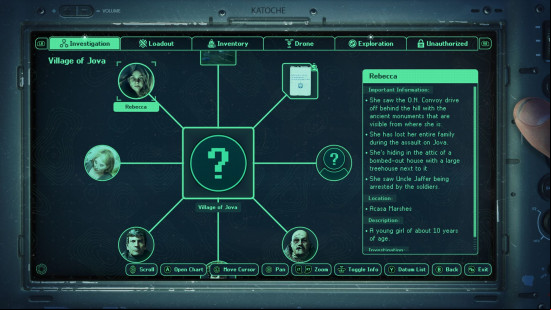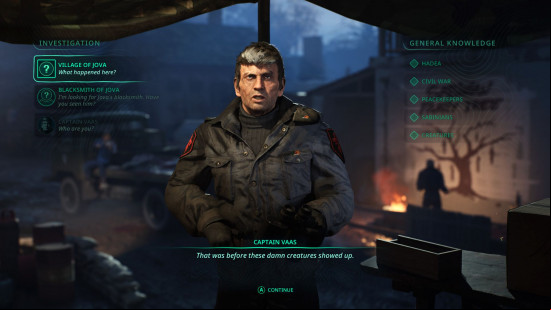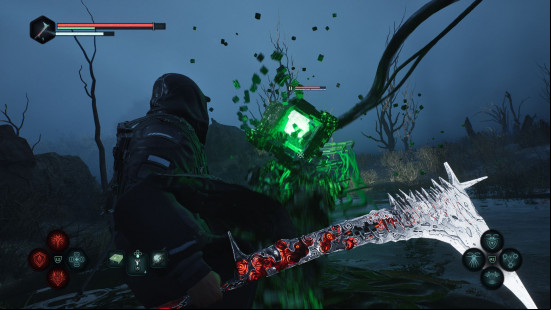I adore sci-fi worlds. Control's The Oldest House. Death Stranding's United Cities of America. Fallout New Vegas' glowing cityscape. Blending the otherworldly with the familiar appeals to me in a way I can't quite describe, and the Hell is Us does that in spades. Supernatural horrors meld into a state at war with itself, creating a hauntingly beautiful environment where player-driven exploration takes center stage. After spending a few hours going hands-on with Rogue Factor's latest, it's safe to say that I came away impressed. Hell is Us could well be a bold open-world experience if it can stick the landing.
Remi, our protagonist, is searching for his parents. After years away from home, he returns to the hermit state of Hadea, which is being torn apart by a bloody civil war. At the same time, a mysterious calamity has also given rise to supernatural entities and alien-like structures. I know as little about this new Hadea as Remi appears to, and Hell is Us is all too eager to keep you guessing in a state of anxious discovery.

Once we've landed, Rogue Factor presents a warning: "Our game has no map, no markers indicating where people or things are, where to go next, or who to talk to. We will never tell you precisely what must be done or how to do it." All I have is a notebook and pen, alongside the hope that this could be enough to help me on my quest.
At first, this was deeply daunting. Many open-world games rely on minimaps, on-screen markers, and hands-on guidance to help you navigate, which comes at the detriment of the genuine exploration and discovery the genre once thrived on. There are exceptions, like Breath of the Wild and Elden Ring, but open-world hand-holding has become the norm.
Hell is Us does away with all that, to fascinating results. Without a permanent in-game map or any quest markers, I was relying on two things: my own sense of intuition, and a datapad. The latter breaks down all the people I've talked to and the information I've heard into a mind map, telling me the key facts they imparted without automatically drawing any conclusions.

Rogue Factor didn't leave me entirely on my own, though. The studio combines points of interest, com directions, and a steady flow of information to keep me on track. NPCs give me directions via specific landmarks, while physical maps and other collectibles suggest where I can go next. The datapad collects all this information together in a neat package, but it's entirely on me to put the pieces together.
I'm not embarrassed to say this can quickly become overwhelming. Jova is one of the first settlements I visit, and the sheer volume of NPCs and clues strewn about made my head spin. But with my datapad and notebook in hand, Hell is Us' central thesis slowly started to click into place. I didn't need to gather every single piece of information, just enough to expand my mind map and figure out the next step on my journey. I could easily speak to every character and dig around every corner, but this isn't a requirement. Instead, an NPC pointed me in a broad direction, and I found a map with an arrow scribbled over the top in a red marker. After exploring Jova a little more and getting my bearings, I found a landmark and was soon on my way.
I was forever finding cryptic puzzles covered in an alien language, keys to locks I was yet to discover, and small hints as to the state of the world around me. While the datapad does collate my conversations and clues for quests, plenty of the puzzles and how they function remained a mystery, so referring back to my notes often provided helpful context. Some videogame heroes jot down notes in their virtual journals, but doing it myself adds a layer of authenticity to the experience. Granted, my notes are a mess, and my puzzle recreations look like they're drawn by a five-year-old, but it's the thought that counts.

This gives the game a tactile quality while heightening my immersion. I'm one of those freaks who enjoyed Breath of the Wild more after turning the UI off and exploring Hyrule by landmarks alone, and Hell is Us feels like the next evolution of that idea. It's old school, with flavors of puzzle games like Myst, but presented through a modern lens thanks to the datapad.
It also helps that Rogue Factor has thought deeply about how to present dialogue and conversations. During a chat, the right-hand side of the screen is filled with questions about lore, side characters, or the world at large. These are dense discussions that pull you into Hadea's history. On the left, however, are more pointed conversations. Each of these can give you a piece of vital information that'll be logged into your datapad, with new follow-up questions appearing when appropriate.

Alongside Rogue Factor's bold take on exploration, Hell is Us is also a game about combat. I faced myriad creatures across Hadea, each of which felt like a Kojima and Remedy hybrid. While Hell is Us is not a soulslike game, the combat will be instantly familiar to anyone who's put time into a recent Fromsoftware release. I was using melee weapons, special abilities, dodging, parrying, and juggling multiple opponents at once. While brutal and weighty, fights aren't overly punishing, nor are they the primary focus. Instead, they're there to offer a change of pace and a different type of challenge.
Combat in Hell is Us still surprises me, though. During fights and exploration, I've got a drone slung over my shoulder, which can stun enemies, use perks, and help me further understand the world by scanning landmarks. Just like the datapad, my drone feels like a tangible, tactile part of this world that bolsters my immersion and Hadea's believability.

I have a lot of respect for what Rogue Factor is trying to build with Hell is Us. I can see the team's vision where traditional forms of in-game assistance are replaced by player-driven discovery, and I appreciate it all the more for how combat isn't the central focus.
Of course, I only played Hell is Us for a few short hours. Exactly how well the exploration works across the full game remains to be seen, but from what I played during my preview, I have faith that Rogue Factor can pull it off. With a memorable setting and a strong exploration hook, Hell is Us is a game I encourage you to try if other open worlds have left you cold.
Rogue Factor and publisher Nacon are set to release Hell is Us on Steam on Thursday September 4. A demo is expected to launch on June 2.
